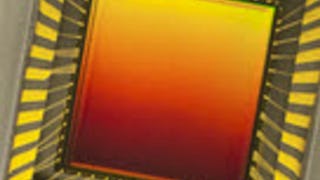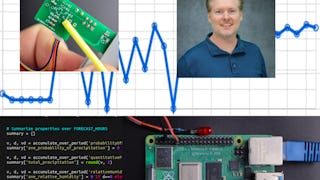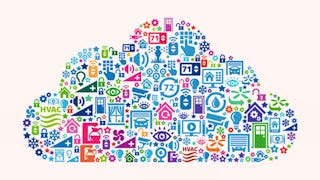This course on integrating sensors with your Raspberry Pi is course 3 of a Coursera Specialization and can be taken separately or as part of the specialization. Although some material and explanations from the prior two courses are used, this course largely assumes no prior experience with sensors or data processing other than ideas about your own projects and an interest in building projects with sensors.


Using Sensors With Your Raspberry Pi
Ce cours fait partie de Spécialisation Raspberry Pi Projects

Instructeur : Drew Wilson
2 151 déjà inscrits
Inclus avec
(11 avis)
Compétences que vous acquerrez
- Catégorie : Real Time Data
- Catégorie : Digital Signal Processing
- Catégorie : Statistical Methods
- Catégorie : Data Processing
- Catégorie : Data Cleansing
- Catégorie : Mathematical Modeling
- Catégorie : Open Source Technology
- Catégorie : Electronics
- Catégorie : Systems Of Measurement
- Catégorie : NumPy
Détails à connaître

Ajouter à votre profil LinkedIn
4 devoirs
Découvrez comment les employés des entreprises prestigieuses maîtrisent des compétences recherchées

Élaborez votre expertise du sujet
- Apprenez de nouveaux concepts auprès d'experts du secteur
- Acquérez une compréhension de base d'un sujet ou d'un outil
- Développez des compétences professionnelles avec des projets pratiques
- Obtenez un certificat professionnel partageable

Il y a 4 modules dans ce cours
This first module gets us all on the same page, no matter how much experience you have with sensors or measurement technology. We'll start by describing a straightforward sensor flow model to help us understand the myriad of sensors available in the world, and which you may later build. Then we'll move into the concepts of accuracy, precision, and uncertainty, which are necessary for understanding the inherent error in any measurement system. This module lays the groundwork for the circuits and examples in later modules.
Inclus
8 vidéos1 devoir
In this module, we'll look at examples of three common methods to store calibration data and apply that data to your sensor measurements. These examples range from simple to sophisticated, but none are complicated. We'll use Python and advanced open-source libraries to do the heavy math, just like you can implement in your Raspberry Pi projects.
Inclus
10 vidéos1 devoir
Once you have a sensor, and have a Raspberry Pi, there is often a need for circuitry in the middle to interface the two. In this module, we'll show how simple amplifier and filter circuits can be used to adapt voltage levels and reduce noise from your sensor data.
Inclus
9 vidéos1 devoir
The great thing about using a Raspberry Pi for your sensor projects is that you have access to great open-source software libraries and lots of processing power to manipulate your sensor data. This module looks at a few techniques for using statistical and digital signal processing methods to clean up your sensor data.
Inclus
6 vidéos1 devoir
Obtenez un certificat professionnel
Ajoutez ce titre à votre profil LinkedIn, à votre curriculum vitae ou à votre CV. Partagez-le sur les médias sociaux et dans votre évaluation des performances.
Instructeur

Offert par
En savoir plus sur Electrical Engineering
 Statut : Essai gratuit
Statut : Essai gratuitUniversity of California, Irvine
 Statut : Essai gratuit
Statut : Essai gratuitJohns Hopkins University

University of California San Diego
 Statut : Essai gratuit
Statut : Essai gratuitJohns Hopkins University
Pour quelles raisons les étudiants sur Coursera nous choisissent-ils pour leur carrière ?





Ouvrez de nouvelles portes avec Coursera Plus
Accès illimité à 10,000+ cours de niveau international, projets pratiques et programmes de certification prêts à l'emploi - tous inclus dans votre abonnement.
Faites progresser votre carrière avec un diplôme en ligne
Obtenez un diplôme auprès d’universités de renommée mondiale - 100 % en ligne
Rejoignez plus de 3 400 entreprises mondiales qui ont choisi Coursera pour les affaires
Améliorez les compétences de vos employés pour exceller dans l’économie numérique
Foire Aux Questions
To access the course materials, assignments and to earn a Certificate, you will need to purchase the Certificate experience when you enroll in a course. You can try a Free Trial instead, or apply for Financial Aid. The course may offer 'Full Course, No Certificate' instead. This option lets you see all course materials, submit required assessments, and get a final grade. This also means that you will not be able to purchase a Certificate experience.
When you enroll in the course, you get access to all of the courses in the Specialization, and you earn a certificate when you complete the work. Your electronic Certificate will be added to your Accomplishments page - from there, you can print your Certificate or add it to your LinkedIn profile.
Yes. In select learning programs, you can apply for financial aid or a scholarship if you can’t afford the enrollment fee. If fin aid or scholarship is available for your learning program selection, you’ll find a link to apply on the description page.
Plus de questions
Aide financière disponible,

